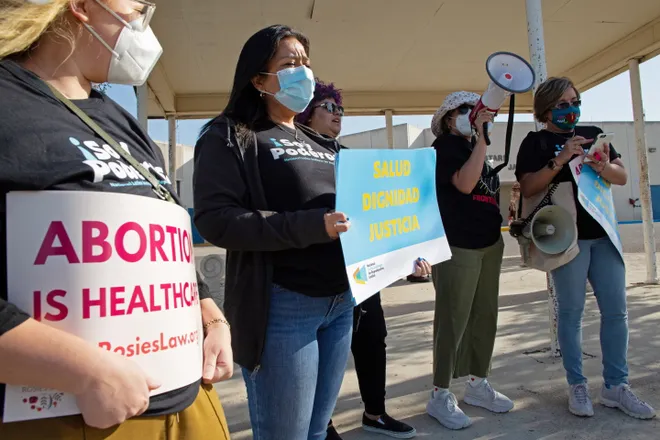Lizelle Gonzalez is suing the Texas prosecutors who charged her criminally after abortion
A Texas woman who was arrested and charged with murder for self-inducing an abortion is suing the two district attorneys who filed the charge for $1 million.
Lizelle Gonzalez, then 26, spent three days in jail in April 2022 after Starr County District Attorney Gocha Ramirez and Assistant District Attorney Alexandria Barrera filed an indictment against her for causing the death of her unborn child after she took an abortion medication at 19 weeks pregnant.
The case came several months after Texas Senate Bill 8 passed, barring abortions after six weeks of pregnancy and allowing private parties to sue anyone for "aiding and abetting" an abortion. However, the law bars mothers from being charged for murder in the death of their own unborn child.

More:Is Nebraska Rep. Don Bacon walking back his abortion stance?
Gonzalez hospitalized after 'incomplete' abortion
Gonzalez, then Lizelle Herrera, visited a local hospital on Jan. 7, 2022, after she took misoprostol to induce an abortion, according to a complaint filed in U.S. District Court for the Southern District of Texas. After doctors still detected a fetal heartbeat, she was discharged and asked to follow up several days later.
Minutes after her discharge, Gonzalez went to the hospital's emergency room with abdominal pain and vaginal bleeding. Doctors found the fetal heartbeat had stopped, and the abortion had been "incomplete" and "spontaneous." A doctor performed a Caesarean section on Gonzalez to deliver her stillborn child.
Gonzalez now claims the hospital staff violated her federal privacy laws by reporting her self-induced abortion to the Starr County District Attorney's Office in the months after her discharge.
On March 30, Ramirez and Barrera filed a murder charge against Gonzalez. According to the complaint, the indictment was based solely on Barrera's examination of reports from the hospital. The lawsuit charges the pair with making "misrepresentations of the facts and the law to a grand jury, recklessly and callously disregarding the rights of plaintiff, allowing a malicious prosecution to commence against her."
An investigatory panel convened by the Texas State Bar in March of last year also fined Ramirez $1,250 for pursuing criminal charges against Gonzalez. The panel banned Ramirez from practicing law for a one year period that began on Monday. Ramirez will be able to keep practicing law if he complies with a settlement reached in January, the Associated Press reported.
The complaint also alleges the Starr County Sherriff's Department and Rio Grande Police Department did not carry out an investigation into the charge.
Starr County Sheriff's Office Major Carlos Delgado declined in an email to comment on the lawsuit. The Rio Grande Police Department declined to comment and said the department has no jurisdiction over the case, so a report was never taken.
Watch:Voters to weigh in on Florida's abortion policy after state's Supreme Court ruling
Gonzalez' arrest just over a week later drew intense media attention. It marked the "first ever murder charge for a self-induced abortion in Starr County," according to the lawsuit.
Gonzalez visited the hospital again while she was incarcerated. She was released three days later, after Ramirez withdrew the indictment.
In the complaint, Gonzalez claims the publicity stemming from her "illegal and unconstitutional" arrest "has forever changed" her life.
"Furthermore, because the charges stemmed from abortion – a hot button political agenda – the dismissal of the charges did not result in any less media attention," the lawsuit reads. "Rather, the media attention was heightened after the dismissal due to the fact that the prosecution was frivolous."
Reproductive rights activists held a rally outside the Starr County Jail while Gonzalez was incarcerated. Frontera Fund, a Texas-based abortion fund, launched a legal defense and reconciliation fund for her.
Ida Cecilia Garza, Gonzalez' attorney, did not return a request for comment by phone or email.
In a news release put out the day after Gonzalez' release, since taken down from Facebook, Ramirez said, "In reviewing applicable Texas law, it is clear that Ms. Herrera cannot and should not be prosecuted for the allegation against her." Ramirez said the matter was "clearly contentious," but was "not a criminal matter."
"Although with this dismissal Ms. Herrera will not face prosecution for this incident, it is clear to me that the events leading up to this indictment have taken a toll on Ms. Herrera and her family," he wrote.
Ramirez and Barrera did not return requests by phone and email for comment on the lawsuit.
Texas Heartbeat Act is among most restrictive nationwide
Senate Bill 8, also known as the Heartbeat Act, became one of the most restrictive and controversial state abortion laws in the country when it was passed in 2021. It went into law immediately when the U.S. Supreme Court overturned Roe v. Wade the following year.
The law bans abortion after fetal cardiac activity is detected, around six weeks into pregnancy, except in cases when the mother's life is at risk, or the pregnancy threatens "impairment of a major bodily function." The law has no exceptions for cases of rape or incest.
Under the law, doctors who perform abortions can face up to 99 years in prison, more than $100,000 in fines, and the loss of their medical license.
Cybele Mayes-Osterman is a breaking news reporter for USA Today. Reach her on email at cmayesosterman@usatoday.com. Follow her on X @CybeleMO.
Disclaimer: The copyright of this article belongs to the original author. Reposting this article is solely for the purpose of information dissemination and does not constitute any investment advice. If there is any infringement, please contact us immediately. We will make corrections or deletions as necessary. Thank you.




